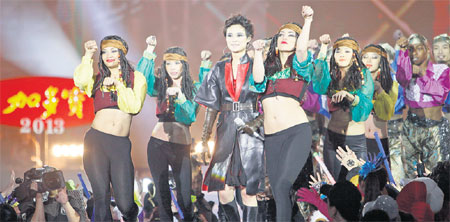Galas hit by frugality push
|
Pop stars like singer Li Yuchun (center)are major features in most variety shows held throughout the country. Provided to China Daily |
The central government's crackdown on extravagance and corruption has not only had an impact on dining and liquor business but also on the gala industry.
The Publicity Department of the Communist Party of China, Ministry of Finance, Ministry of Culture, National Audit Office and the State Administration of Press, Publication, Radio, Film and Television released a notice in August 2013, urging the end of extravagant galas, which usually consist of variety shows, and asking the public to hold more frugal galas in the future.
The notice pointed out that too many galas had been staged recently, most of which cost a huge amount of money. The event organizers end up competing to host the most extravagant event, which is a waste of money. This is especially true with galas held by local governments that propagate malpractice and impair the image of the Party and the government.
Chen Shaofeng, deputy director of the Institute for Cultural Industries at Peking University, estimated that the gala industry shrunk by 50 percent after the notice was released.
The tightening policy is not good news for Cao Rui, who founded her own gala organizing company, Beijing Shichuang Co Ltd, in 2013.
Her company mostly organizes regional singing contests for children. Usually the contests are more like galas, with company leaders making speeches, hosting lucky draws and inviting well-known singers to perform. The price is usually around 200,000 yuan ($32,800) a show. If singers are invited, the price can reach 500,000 yuan to even 1 million yuan depending on the prestige of the singer.
"Usually companies like to have the local government sponsor the contests or galas. Only in this way can they make the scale of the gala bigger and make the gala a reality," Cao says.
She says companies are more sensitive since the notice urging more frugal galas. It is difficult to seek sponsors or advertisers, she says. "People nowadays are less willing to hold galas, which means less income to us."
With a whole team of actors and actresses, as well as a group of professional stage lighting designers, Shanghai Xintang PR Event Consulting Co Ltd has long experience in organizing galas or parties. The price it charges for one gala varies from 70,000 yuan to 500,000 yuan.
Xintang's marketing manager, surnamed Han, says companies or institutions usually come to them two or three months before holding a gala, which is especially necessary around holidays.
Despite the tightening control on galas, Xintang's business was not much affected, Han says. She says they have received about six orders so far, all of which are for galas to be held in January.
Shao Beibei has been working as a gala hostess in Shanghai for more than four years. Although most of the galas she will host around the New Year are those from multinational companies, which are less affected by the central government's policies, Shao has noticed some changes. "Some companies still would like to invite some government officials to attend their company's galas or ceremonies. But all the officials are trying to be low-profile these days. They simply come, give a short speech and quickly leave the venue. They were not like this in the past," she says.



















